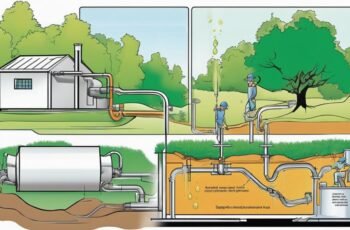To keep your septic tank healthy, cleaners often include surfactants to break down waste, enzymes to decompose organic matter, and beneficial bacteria to aid in digestion. However, caution is needed as surfactants can harm aquatic life and excess enzymes may disrupt ecosystems. Avoid chlorine bleach, ammonia, and phosphates that can harm the system. Consider natural solutions like vinegar, baking soda, lemon juice, and essential oils to maintain septic health. Be mindful that harsh chemicals can damage beneficial bacteria, leach into soil, and pose health risks. Prioritize eco-friendly and biodegradable options for a sustainable septic system.
Key Takeaways
- Surfactants break down grease and waste.
- Enzymes aid in organic matter decomposition.
- Bacteria assist in waste digestion.
- Avoid chlorine bleach and ammonia.
- Choose eco-friendly, non-toxic options.
Common Ingredients in Septic Tank Cleaners
When it comes to understanding the composition of septic tank cleaners, it is important to be aware of the common ingredients typically found in these products. Septic tank cleaners often contain chemicals like surfactants, enzymes, and bacteria. Surfactants help break down grease and solid waste, enzymes aid in the decomposition of organic matter, and bacteria assist in the digestion of waste. While these ingredients are effective in maintaining septic systems, it is vital to be mindful of their potential harmful effects and environmental impact.
Surfactants can have detrimental effects on aquatic life if they enter water bodies through runoff. Enzymes, although natural, can cause imbalances in ecosystems if released in excessive amounts. Bacteria, while beneficial for breaking down waste, can pose a risk if they are genetically modified strains that could potentially harm the environment. Understanding the balance between using these ingredients for ideal septic tank performance and minimizing their negative impact on the environment is key for responsible septic system maintenance.
Chemicals to Avoid in Cleaner Products
What harmful chemicals should you avoid when selecting septic tank cleaner products? When choosing a septic tank cleaner, it's important to stay away from chemicals that pose potential risks to your health and the environment. One common ingredient to avoid is chlorine bleach, as it can harm the beneficial bacteria in your septic system that are vital for breaking down waste. Another chemical to keep clear of is ammonia, which can disrupt the natural balance of your septic tank and harm aquatic life when it enters water bodies.
Additionally, products containing phosphates should be evaded, as they can lead to excessive algae growth in water sources, causing damage to aquatic ecosystems. Synthetic fragrances and dyes are also best to avoid, as they can contain harmful chemicals that are not environmentally friendly options.
To ensure the longevity and effectiveness of your septic system while minimizing negative impacts on the environment, choose septic tank cleaner products that are free from these harmful chemicals. Opt for eco-friendly options that are safe for both your septic system and the planet.
Natural Alternatives for Septic Maintenance
Consider using natural alternatives for septic maintenance to promote a healthier and more sustainable septic system. When looking for eco-friendly solutions, DIY recipes can be an excellent choice. Here are five natural alternatives you can easily incorporate into your septic system maintenance routine:
- Vinegar: Its acidic nature helps control odor and break down waste in the septic tank. For a more effective breakdown of waste, consider combining vinegar with SEPTIFIX's powerful aerobic bacteria.
- Baking Soda: Acts as a natural cleaner and deodorizer, promoting a balanced pH in the tank.
- Lemon Juice: Contains citric acid, which can help break down waste and prevent clogs.
- Essential Oils: Tea tree or eucalyptus oils have antimicrobial properties that can aid in maintaining a healthy septic system.
- Yogurt: Adding plain yogurt to the tank introduces beneficial bacteria that aid in breaking down waste.
Impact of Ingredients on Septic System
The ingredients used in septic tank cleaners play a pivotal role in maintaining the functionality and health of the septic system. When considering the impact of these ingredients, it is important to address both environmental concerns and health implications.
Environmental concerns arise from the chemicals present in some septic tank cleaners. Harsh chemicals can disrupt the natural balance of the septic system, harming beneficial bacteria responsible for breaking down waste. Additionally, these chemicals can leach into the soil and groundwater, posing risks to surrounding ecosystems.
Health implications also need to be taken into account. Some ingredients found in septic tank cleaners can be harmful if inhaled or come into contact with skin. These substances may cause respiratory issues, skin irritations, or other health problems if proper precautions are not taken during use.
To secure the longevity and effectiveness of your septic system while minimizing negative impacts on the environment and health, it is essential to choose cleaners with environmentally friendly and non-toxic ingredients.
Choosing the Best Cleaner for You
To select the most suitable cleaner for your septic system, it is important to evaluate the composition of the products available in the market. When choosing the best cleaner for your septic tank, consider the following:
- Eco friendly options: Look for cleaners that are environmentally friendly and biodegradable to minimize harm to your septic system and surrounding ecosystems.
- DIY solutions: Explore DIY recipes using natural ingredients like baking soda, vinegar, or lemon juice that can effectively clean your septic tank without harsh chemicals.
- Septic-safe labels: Opt for products specifically labeled as safe for septic systems to avoid damaging the delicate balance of beneficial bacteria in your tank.
- Enzyme-based cleaners: Consider cleaners containing enzymes that help break down organic matter in your septic tank, promoting better overall function.
- Non-toxic formulas: Choose cleaners that are free from harmful chemicals like bleach or ammonia to safeguard the health of your septic system and the environment.

